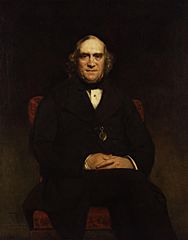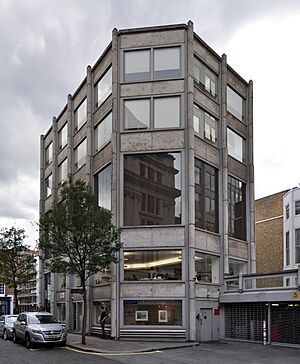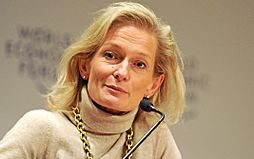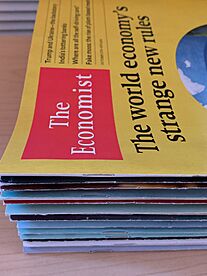The Economist facts for kids
 |
|
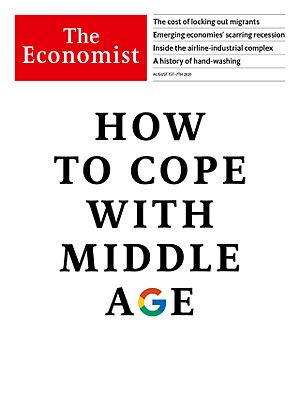
The cover of the August 1, 2020 issue.
|
|
| Owner(s) | The Economist Group |
|---|---|
| Founder(s) | James Wilson |
| Founded | September 1843 |
| Political alignment | Radical centrism Economic liberalism Social liberalism |
| Headquarters | The Adelphi, 1–11 John Adam St, Westminster, London WC2N 6HT, United Kingdom |
| Circulation | 490,944 (as of 2023) |
| ISSN | 0013-0613 |
| OCLC number | 1081684 |
The Economist is a British weekly publication that covers news and world events. You can read it as a printed magazine or online. Although it looks like a magazine, it calls itself a "newspaper." It focuses on topics like economics, business, world politics, technology, and culture.
Most of its articles are written in London, but it also has offices in the United States, Europe, Asia, and the Middle East. The newspaper is known for using data and charts to explain complex topics. It focuses more on explaining the news rather than just reporting it.
The Economist was started in 1843 by a Scottish businessman named James Wilson. He wanted to convince the British government to get rid of the Corn Laws, which were taxes on imported grain that made food expensive. Over time, the newspaper began to cover more topics, like politics and finance.
The newspaper has a famous bright red logo. Its articles are written anonymously, meaning the author's name is not listed. This is done so the newspaper speaks with a single, unified voice. The Economist also publishes a lifestyle magazine called 1843 and produces podcasts and films.
The newspaper's views are based on classical, social, and especially economic liberalism. This means it supports ideas like free markets, free trade between countries, and personal freedom. It often supports policies that are in the political center, rather than on the far left or right.
Contents
History of The Economist
Why It Was Created
The Economist was founded by James Wilson, a British businessman, in 1843. His main goal was to end the Corn Laws. These laws put high taxes on grain imported into Britain, which made bread and other foods more expensive for ordinary people. Wilson believed in free trade, the idea that goods should move between countries without high taxes.
In the first issue, Wilson listed the topics the newspaper would cover. These included:
- Applying free-trade ideas to important issues.
- Writing about business, farming, and foreign topics.
- Explaining basic ideas of political economy (how a country's economy works).
- Reporting on the British Parliament, especially on trade and farming.
- Covering news from London, Scotland, and Ireland.
- Discussing business topics like markets, new inventions, and shipping.
- Sharing farming news, including new tools and methods from other countries.
- Reporting on foreign countries and the benefits of free trade.
Wilson said the newspaper's mission was to take part in "a severe contest between intelligence, which presses forward, and an unworthy, timid ignorance obstructing our progress." This phrase is still printed in the newspaper today.
How It Changed Over Time
For a long time, The Economist was respected for its reporting. Even Karl Marx, a famous thinker, read it. He said it represented the interests of the rich and powerful.
In 1920, the newspaper's circulation (the number of copies sold) was about 6,000. In 1959, it got its famous fire engine red logo, which was designed by Reynolds Stone. In 1971, it changed from a large newspaper format to the smaller magazine style it has today.
The newspaper has faced criticism over the years. Some critics have said that its opinions don't always match its news stories. Others have said it doesn't do enough original reporting and just summarizes news for business leaders.
In 2012, The Economist launched a new section just for China. This was the first new country section it had added since it created one for the United States in 1942.
In 2015, the company that owned half of the newspaper, Pearson, sold its share. The Agnelli family from Italy bought a large part of it, becoming a major shareholder.
How the Newspaper is Organized
The Economist is part of The Economist Group.
Who Owns The Economist
For many years, the company Pearson plc owned a 50% share. In 2015, they sold it. The Italian Agnelli family's company, Exor, now owns 43.4%. Other owners include the Rothschild and Cadbury families, as well as some staff members.
A board of trustees appoints the editor. The editor cannot be fired without the board's permission. This helps protect the newspaper's independence.
About two-thirds of the 75 journalists work in London. However, because more than half of its readers are in the United States, it also has large offices in cities like New York City and Washington D.C.
Who is the Editor
The editor-in-chief is in charge of the newspaper's opinions and business operations. Here is a list of the editors since it was founded:
- James Wilson: 1843–1857
- Richard Holt Hutton: 1857–1861
- Walter Bagehot: 1861–1877
- Daniel Conner Lathbury: 1877–1881 (jointly)
- Robert Harry Inglis Palgrave: 1877–1883 (jointly)
- Edward Johnstone: 1883–1907
- Francis Wrigley Hirst: 1907–1916
- Hartley Withers: 1916–1921
- Sir Walter Layton: 1922–1938
- Geoffrey Crowther: 1938–1956
- Donald Tyerman: 1956–1965
- Sir Alastair Burnet: 1965–1974
- Andrew Knight: 1974–1986
- Rupert Pennant-Rea: 1986–1993
- Bill Emmott: 1993–2006
- John Micklethwait: 2006–2014
- Zanny Minton Beddoes: 2015–present
Writing Style and Voice
The Economist has a unique writing style. It aims to have a single, consistent voice across all its articles, as if one person wrote everything. The writing is known for being witty, clear, and using language precisely.
The newspaper assumes its readers have a basic understanding of economics. For example, it might mention terms like "demand curve" without explaining them in detail. However, it tries to make its articles easy for any educated person to read, not just experts.
Why Articles are Anonymous
Almost none of the articles in The Economist have the author's name on them. This is called a byline. Even the editor's name is not printed in the magazine. This is a long-standing tradition.
The editors say this is because the "collective voice and personality" of the newspaper are more important than the identities of the individual journalists. It shows that the articles are a team effort. Instead of using their names, writers often refer to themselves as "your correspondent."
Some people have criticized this anonymity. They argue it can hide the fact that some writers might be young or inexperienced. However, the names of the journalists are available on the newspaper's website.
What's Inside The Economist
The main focus of The Economist is on world events, politics, and business. It also has regular sections on science, technology, books, and art. Every couple of weeks, it includes a special in-depth report on a specific topic.
Special Columns
The newspaper has several opinion columns, each with a special name that relates to its topic:
- Bagehot (Britain): Named after Walter Bagehot, an early editor.
- Banyan (Asia): Named after the banyan tree.
- Bartleby (Work and management): Named after a character in a short story.
- Buttonwood (Finance): Named for the tree where early Wall Street traders met.
- Chaguan (China): Named after traditional Chinese teahouses.
- Charlemagne (Europe): Named after the first Holy Roman Emperor.
- Johnson (Language): Named after Samuel Johnson, who wrote an early English dictionary.
- Lexington (United States): Named for a town where the American Revolutionary War began.
- Schumpeter (Business): Named after the economist Joseph Schumpeter.
Other Publications
1843 Magazine
In 2007, The Economist started a lifestyle magazine. In 2016, it was renamed 1843 after the year the newspaper was founded. It is published six times a year and covers topics like art, style, food, and travel. Unlike The Economist, articles in 1843 do show the author's name.
Country of the Year
Since 2013, The Economist has chosen a "Country of the Year." This award goes to the country that has improved the most in the past year.
- 2013:
 Uruguay
Uruguay - 2014:
 Tunisia
Tunisia - 2015:
 Myanmar
Myanmar - 2016:
 Colombia
Colombia - 2017:
 France
France - 2018:
 Armenia
Armenia - 2019:
 Uzbekistan
Uzbekistan - 2020:
 Malawi
Malawi - 2021:
 Italy
Italy - 2022:
 Ukraine
Ukraine - 2023:
 Greece
Greece - 2024:
 Bangladesh
Bangladesh
Using Data in Journalism
The Economist has used data since it was founded in 1843. At first, it just published tables with trade numbers. Today, it is known for its charts and graphs that help explain the news. This is called data journalism.
In 2015, the newspaper created a special data team. This team of journalists and designers creates charts, maps, and even models to predict election outcomes. To be open about their work, the team often shares its computer code and data with the public.
Famous Indexes
The newspaper is famous for creating several indexes that compare things around the world. Some of the most well-known are:
- The Big Mac Index: First published in 1986, this index compares the price of a Big Mac hamburger in different countries to see if currencies are valued correctly.
- Democracy Index: This measures how democratic countries are around the world.
- The Glass Ceiling Index: This measures equality for women in the workplace.
The Newspaper's Opinions
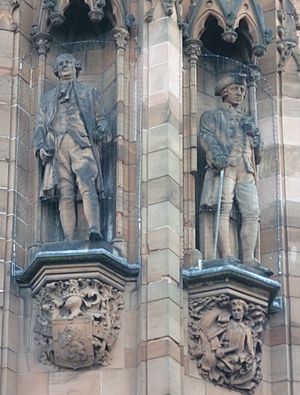
The views of The Economist are mainly based on classical liberalism and economic liberalism. It supports ideas that are in the political center. The newspaper is a strong supporter of:
- Free markets: Letting businesses operate with few government rules.
- Free trade: Allowing goods to be bought and sold between countries without high taxes.
- Free immigration: Making it easier for people to move to and work in other countries.
- Globalisation: The idea that countries are becoming more connected through trade and culture.
On social issues, The Economist has supported same-sex marriage, gun control, and environmental policies like a carbon tax to fight global warming.
The newspaper endorses, or recommends, candidates in elections. In the United Kingdom, it has supported the Labour Party, the Conservative Party, and the Liberal Democrats at different times. In the United States, it has supported both Republican and Democratic candidates.
Censorship Around the World

Sometimes, when The Economist criticizes governments, those governments try to stop people from reading it. This is called censorship.
For example, in 2006, Iran banned an issue because it had a map that labeled the Persian Gulf as just the "Gulf." This is a sensitive political issue in the region.
In other countries, certain pages might be torn out of the magazine before it is sold if the government does not like what is written on them.
See also
 In Spanish: The Economist para niños
In Spanish: The Economist para niños
- List of business newspapers
- List of newspapers in the United Kingdom
 | Bessie Coleman |
 | Spann Watson |
 | Jill E. Brown |
 | Sherman W. White |


